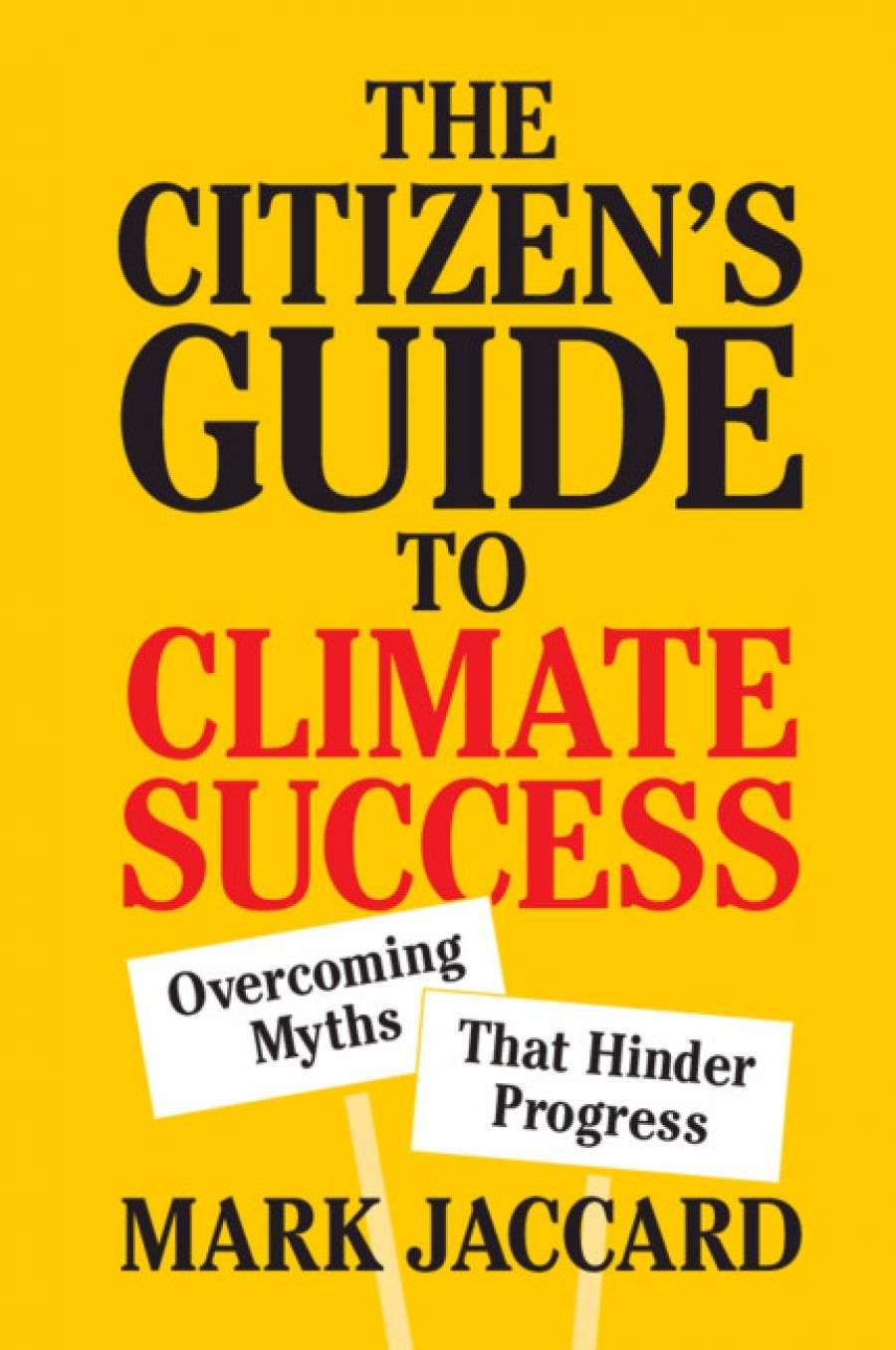
- Free Article: No
- Contents Category: Environmental Studies
- Review Article: Yes
- Custom Highlight Text:
Written by a prominent economist with a long career in emissions reduction and policy modelling, this engaging book attempts to debunk eleven myths that undermine effective climate action. Jaccard also offers a ‘simple’ path to climate success, built around strong regulatory action, carbon pricing, a system of carbon tariffs, and supporting poorer countries in energy transitions. Jaccard focuses on emissions reduction in the transport and energy sectors, in line with his areas of expertise.
- Grid Image (300px * 250px):

- Book 1 Title: The Citizen’s Guide to Climate Success
- Book 1 Subtitle: Overcoming myths that hinder progress
- Book 1 Biblio: Cambridge University Press, $27.95 pb, 304 pp
- Book 1 Readings Link: booktopia.kh4ffx.net/bYjkP
Some of these myths are discounted more convincingly than others, and at times who and what Jaccard leaves out of his analysis may cause one to question his conclusions. For instance, he sees a significant role for biofuels in emissions reduction, and favourably discusses how Brazil has reduced CO2 emissions using sugarcane ethanol. He does not discuss the food security or biodiversity implications of this approach or the potential for deforestation, troubling omissions given that Jair Bolsonaro, president of Brazil since January 2019, has opened the Amazon to sugarcane production (admittedly the book’s manuscript likely predates Bolsonaro’s decree, but it was also not an unforeseeable development).
 Amazon fires, 15–22 August 2019, satellite image taken by MODIS (photograph via Wikimedia Commons)
Amazon fires, 15–22 August 2019, satellite image taken by MODIS (photograph via Wikimedia Commons)
This book is consistently engaging and accessible, partly because of how Jaccard weaves in history and personal experience. Some of his historical parallels are more helpful than others (I am unaware of anyone arguing that climate change is like the Apollo Program or the Manhattan Project, so I am unsure why he bothers extensively arguing the reverse), and the elements of memoir range from charming to somewhat limiting. Jaccard writes with endearing pride of his many former students doing valuable work in this field, and his incorporation of their work into this text is exactly what a good academic mentor should do. Elsewhere, however, the way Jaccard centres himself in the narrative comes at the expense of more thoughtful analysis. In the conclusion, Jaccard congratulates his own participation in civil disobedience; what activists and organisers might find irritating here is that Jaccard admits this was his one and only foray into direct action. He conflates the long-term work of community organising for climate action and climate justice with one arrestable action taken by a prominent professor. Indeed, elsewhere in the work he seems impatient with or dismissive of other front-line climate activists, including many without his status or privileges.
Ultimately, Jaccard is firm in his view that systemic political-economic change is not necessary for substantial emissions reduction. Indeed, he devotes one chapter to debunking the ‘myth’ that capitalism must be abolished for energy transition. As someone who does tend to think that social-ecological sustainability and justice are inconsistent with capitalist hegemony, I turned to this chapter with great curiosity. I was disappointed to find it little more than a critique of Naomi Klein’s This Changes Everything: Capitalism vs. the climate (2014), rather than a substantial grappling with the contradictions and fractures of capitalism presented by climate change. Jaccard argues that ‘climate-sincere’ politicians can enact regulations and policies that trigger substantial emissions reduction without broader systemic change. He reflects, sadly, that sincere politicians are few, and acknowledges that powerful and wealthy fossil fuel interests can influence or mislead politicians. However, he does not interrogate the often incestuous entanglements of these groups or consider the ways in which capitalism can dangerously subvert democratic processes. Jaccard’s theory of change seems to rest on electing smart, sincere people, and equipping them with sensible and well-informed analyses of the relative economic and political merits of different policy options for emissions reduction.
Critical climate scholars and activists might find such liberalism naïve or Sorkinian, but Jaccard balances this with the frustration and occasional cynicism one can expect from a scholar who has been in this game a long time. I admire his stamina in a field beset by frustrations and setbacks. But the contradictions get a little messy: he argues that we need to broaden the policy window, but openly scoffs at abolishing fossil fuel subsidies. He scolds ‘environmentalists’ for not giving Canada’s Trudeau government enough credit for their actions on climate change, just because that same government also supports the Trans Mountain pipeline (an expansion Jaccard himself argues against earlier in the book). Jaccard makes no mention of the extensive resistance of indigenous peoples to this project, nor does he show any understanding of why indigenous peoples might be less inclined to dismiss Trudeau’s support as a mere ‘wart’ on the face of an otherwise climate-sincere administration. Similarly, he praises Bill Gates and his investment in emissions reduction with wistful affection, without mentioning Gates’s heavy investment in fossil fuels.
The Citizen’s Guide to Climate Success would have benefited from considering who and where this imagined citizen is, and indeed the idea of citizenship itself. Notwithstanding some references to ‘poorer countries’, Jaccard by and large ignores questions of justice and equity, as well as the long-standing struggles for climate justice led by indigenous people, people of colour, and poorer people. At times, this oversight undermines his analysis and arguments (his account of Hurricane Katrina makes no mention of race, despite overwhelming evidence this disaster was racialised). More a book for policy operators than activists, Jaccard’s ‘citizen’ is flat, universal – sometimes entirely conflated with ‘consumer’ (a common error of economists), sometimes with ‘consumer-plus-voter’ (a common error of liberalism).


Comments powered by CComment